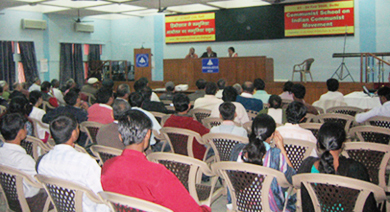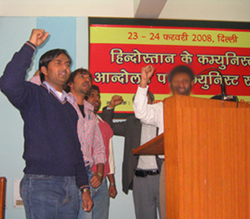
Archive 2009
|
March 1-15, 2008
Historic initiative of the CC of the CGPI: Communist School on the Indian Communist Movement
On the opening day, the registration desk at the school was abuzz with excitement as delegates trooped into the hall with eager anticipation. They came from different regions of the country, as well as from abroad. There were activists engaged in organising workers and peasants. There were activists of the women’s movement. There were leaders of youth and students. There were activists from national liberation movements and the movement for human rights in the Northeast.
The focus of study and discussion during the two days was the communist movement in India. The presentations covered the development of the communist movement in India from its founding in1925 till today, through the twists and turns of the revolutionary struggle. They dealt with the Communist Party of India, the Communist Party of India (Marxist), the parties that emerged following the disintegration of the Communist Party of India (Marxist-Leninist) and the Communist Ghadar Party of India. There were also presentations on Maozedong Thought, as well as on Marxist-Leninist teachings on the different stages in development of human society, from primitive communism to modern communism, through feudalism, capitalism and socialism.
Comrade Lal Singh pointed out that Eurocentric thought has so deeply pervaded all realms of learning and scholarship that it is not even easy to find a true historical account of the movement. Countless martyrs who have laid down their lives for the cause of revolution find no mention in the history of the movement! Comrade Lal Singh pointed out that we must critically look at whether the parties under study are aiming to establish the dictatorship of the proletariat as the necessary condition to overthrow capitalism and build socialism and communism, or not. Commitment to this goal is really the essence, the touchstone of whether a party is communist or not. It is the responsibility of every party in the communist movement to look at itself as well as others with this perspective and evolve its plan of action. Comrade Lal Singh pointed out that every party claims to be the repository of the ‘correct line’. The aim of this school is not to prove that CGPI is right or that other parties are wrong, but to find out what is blocking the advance of the communist movement in India. The presentations on each of the parties covered the origin and context of its founding and its organizational principles. They studied the analysis of the nature of the epoch and of the present period, and the general line of March at this time. They dealt with the stand on the nature of Indian society and state on the character of the ruling class, and the stage of the revolution. They took up the approach to the national question, to the working class and peasantry and other oppressed sections. The presentations also dealt with the approach of each party to the important question of restoration of communist unity in India, as well as the approach to the international communist movement and its historical developments. The objective of the school was to arm the communists of our Party with a critique of the movement, to understand why revolution is still marking time in India, even after more than 80 years of the founding of the Communist Party in India. It was to equip comrades with the ideas necessary to contribute effectively to the task of restoration of communist unity, by engaging other communists in the movement in discussion on the key questions confronting Indian communists. Following the presentations, the floor was open for interventions from the delegate students. Many participants expressed their views as well as asked questions. The discussion reflected the high level of seriousness and consciousness amongst the participants. Comrades expressed their whole-hearted agreement with the usefulness of such a school and lauded the Party's continued efforts to educate its cadres. There was unanimity that there is need to study and educate ourselves, to constantly develop our understanding, so that we may effectively counter the bourgeoisie – our main enemy. The School concluded with the singing of revolutionary songs in many languages and a militant rendering of the Internationale. As Comrade Lal Singh pointed out, the task of communists is to organize and make the working class and people conscious. But communists will not be able to fulfil this role if they themselves are confused. The Communist School is one more step in the Party's constant endeavour to raise the level of knowledge and consciousness of us communists of the CGPI, so that we are able to effectively fulfil our role of making the people conscious! |


